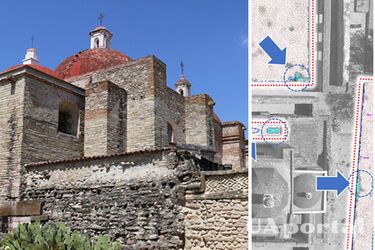A mysterious labyrinth, which may be a thousand years old, was found under a temple in Mexico (video)

Archaeologists working at the site of Mitla in southern Mexico have stumbled upon a fascinating discovery reminiscent of the adventures of the famous archaeologist Indiana Jones. They found a labyrinth of chambers and passages hidden under a church that is the "entrance" to the underworld.
The buildings, erected more than 1000 years ago by the ancient Zapotecs, were used as a religious temple and are known as Liobaa, which translates to "place of rest". Below the surface is a network of underground chambers located at a depth of about 5-8 meters, according to ScienceAlert.
To identify the underground structures, the researchers used three scanning methods: ground penetrating radar to measure electromagnetic wave reflections, resistivity tomography to measure the development of electric currents, and seismic noise tomography to measure the progression of seismic waves.
By combining these data, the team of archaeologists created a complete map of the underground structures. The site of Liobaa is now home to a church built after the arrival of the missionaries. The entrance to the underground network was hidden under the church altar, but now it has been mapped.
The writings of Dominican Father Francisco de Burgoa from 1674 describe an underground temple at this site, including several branched chambers that are interconnected, as well as numerous caves and tunnels deep underground. Now these resting places have been found again.
The Zapotecs had a deep belief in the underworld, they honored many gods and performed various rituals, particularly at the time of death.
The temple is believed to have been in use until the end of the 15th century, after which the region was conquered by the Aztecs and then the Spanish. Thanks to modern 3D imaging techniques, the network of underground structures can be restored.
This is just the beginning of the Llobaa project, and the researchers plan to conduct further scans and research in the area for many years. The team consists of 15 multidisciplinary researchers, including archaeologists and engineers.
Earlier, we reported how scientists in Tanzania accidentally stumbled upon mute frogs that no one had ever seen before.
Here are photos of amazing ancient drawings found in the Peruvian desert.
If you want to get the latest news about the war and events in Ukraine, subscribe to our Telegram channel!
